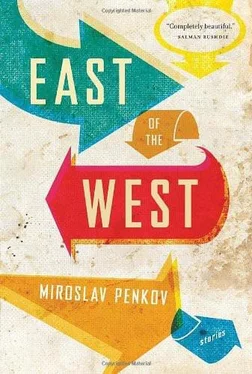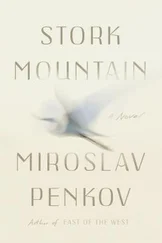Every English word I knew, I had once written at least ten times in notebooks Grandpa brought from the Fatherland Front. Each page in these notebooks was a cliff face against which I shouted. The words flew back at me, smashed into the rock again, rushed back. By the end of high school I had filled with echoes so many notebooks they towered on each side of my desk.
But now in America, I was exposed to words I didn’t know. And sometimes words I knew on their own made no sense collected together. What was a hotpocket? I wondered. Why was my roommate so excited to see two girls across the hallway making out? What were they making out? I felt estranged, often confused, until gradually, with time, the world around me seeped in through my eyes, ears, tongue. At last the words rose liberated. I was ecstatic, lexicon drunk. I talked so much my roommate eventually quit spending time in our room and returned only after I’d gone to bed. I cornered random professors during their office hours and asked them questions that required long-winded answers. I spoke with strangers on the street, knowing I was being a creep. Such knowledge couldn’t stop me. My ears rang, my tongue swelled up. I went on for months, until one day I understood that nothing I said mattered to those around me. No one knew where I was from, or cared to know. I had nothing to say to this world.
I barricaded myself in the dorm — a narrow cell-like room cluttered with my roommate’s microwave, refrigerator, computer, speakers and subwoofer, TV, Nintendo. I watched Married with Children and Howard Stern . I spoke with my parents, rarely, briefly, because the calling rates were high. I cradled the receiver, fondled the thin umbilical cord of the phone that stretched ten thousand miles across the sea. I listened to my mother and felt almost connected. But when the line was cut, I was alone.
•
When he was thirty and holding the position something-of-the-something, Grandpa met the woman of his heart. It was the classic Communist love story: They met at an evening gathering of the Party. Grandma came in late, wet from the rain, took the only free seat, which was next to Grandpa, and fell asleep on his shoulder. He disapproved of her lack of interest in Party matters, and right there on the spot he fell in love with her scent, with her breath on his neck. After she woke up, they talked about pure ideals and the bright future, about the capitalist evil of the West, about the nurturing embrace of the Soviet Union and, most important, about Lenin. Grandpa found out that they both shared the same passion for following his shining example, and so he took Grandma to the Civil Office where they got married.
Grandma died of breast cancer in 1989, only a month after communism was abolished in Bulgaria. I was eight and I remember it all very clearly. We buried her in the village. We put the open coffin in a cart and tied the cart to a tractor, and the tractor pulled the cart and the coffin and we walked behind it all. Grandpa sat by the coffin, and held Grandma’s dead hand. I don’t think it actually rained that day, but in my memories I see wind and clouds and rain; the quiet, cold rain that falls when you lose someone close to your heart. Grandpa shed no tears. He sat in the cart, the rain from my memory falling on him, on his bald head, on the coffin, on Grandma’s closed eyes; the music flowing around them — deep, sad music of the oboe, the trumpet, the drum. There is no priest at a Communist funeral. Grandpa read from a book, volume twelve of Lenin’s collected works. His words rose to the sky, and the rain knocked them down to the ground.
“It’s a good grave,” Grandpa was saying when it was all over. “It’s not as narrow as a dugout, which makes it good. Right? It’s not too narrow, right? She’ll be all right in it. Certainly, she’ll be all right.”
It was this funeral, with Grandpa’s words rising and falling broken in the mud, that I started to dream about during my sophomore year of college. I no longer went to class regularly because the professors’ words now tormented me like a rash, but I read a great deal in my room. I had chosen psychology as my major, mostly on a whim, so I devoured Freud and Jung in industrial quantities. “Their words are the yeast that brings my brain to life,” I’d tell Grandpa a few months later, and he would say, “You got that right. Your brain is dough. Or better yet — crabapple mash.”
I was fascinated to learn that our dreams reflected not only our personal unconscious but also the collective. My God, was there such a thing? A collective unconscious? If so, I wanted in. I longed to be a part of it; connected, to dream the dreams of other people, others to dream my dreams. I went to sleep hoping to dream vivid, transcendental symbols.
Today , I wrote in a little journal, I dreamed of Father on the sofa, peeling sunflower seeds, his socks pulled off halfway like donkey ears .
I dreamed of Mother spooning yogurt from a jar .
I dreamed of Grandpa, waiting in the hallway to trip me up with his cane .
It was after this particular dream and after two years without Grandpa’s voice that I finally picked up the phone, on the eve of Fourth of July, and dialed.
I tried to imagine him, out in the yard, straining his eyes to read in the dusk. He would hear the ringing phone, and slowly, with pain, make his way into the house. I tried to see his face, so old and terrifying that I graced it with an imaginary beard to hide its age. The beard must be white, I thought. No, yellow from nicotine. A lion’s mane, angry and wild, which had consumed the face. Two fiery eyes peered out from the mane, burning with Lenin’s words. Electrification plus Soviet power equals Communism. Give us the child for eight years and it will be a Bolshevik forever . I waited, petrified, for his incinerating voice to turn me to ash, for his brimstone breath to scatter me like wind.
“Grandpa,” I said.
“Sinko.”
I shivered so bad the cord between us crackled. I was afraid he’d hung up already.
“Grandpa, are you there?”
“I’m here.”
“You’re there,” I said. I said, “Grandpa, there is so much water between us. We are so far apart.”
“We are,” he said. “But blood, I hope, is thicker than the ocean.”
•
After Grandma’s funeral, Grandpa had refused to leave the village. In one year he’d lost everything a man could lose: the woman of his heart, and the love of his life — the Party.
“There is no place for me in the city,” I remember him telling my Dad. “I have no desire to serve these traitors. Let capitalism corrupt them all, these bastards, these murderers of innocent women.”
Grandpa was convinced that it had been the fall of communism that had killed Grandma. “Her cancer was a consequence of the grave disappointments of her pure and idealistic heart,” Grandpa would explain. “She could not watch her dreams being trampled on so she did the only possible thing an honest woman could do — she died.”
Grandpa bought a village house so he could be close to Grandma, and every day at three o’clock in the afternoon he went to her grave, sat by the tombstone, opened volume twelve of Lenin’s collected works and read aloud. Summer or winter, he was there, reading. He never skipped a day, and it was there, at Grandma’s grave, that the idea hit him.
“Nothing is lost,” he told me and my parents on one Saturday visit. “Communism may be dead all over this country, but ideals never die. I will bring it all here, to the village. I will build it all from scratch.”
On October 25, 1993, the great October village revolution took place, quietly, underground, without much ado. At that time, everybody who was sixty or younger had already left the village to live in the city, and so those who remained were people pure and strong of heart, in whom the idea was still alive and whose dark eyes glowed with the spark of something new, great and profoundly world-changing. Officially, the village was still part of Bulgaria, and it had a mayor who answered to the national government and so on and so forth; but secretly, underground, it was the new Communist village party that decided its fate. The name of the village was changed from Valchidol to Leningrad. Grandpa was unanimously elected secretary general.
Читать дальше











